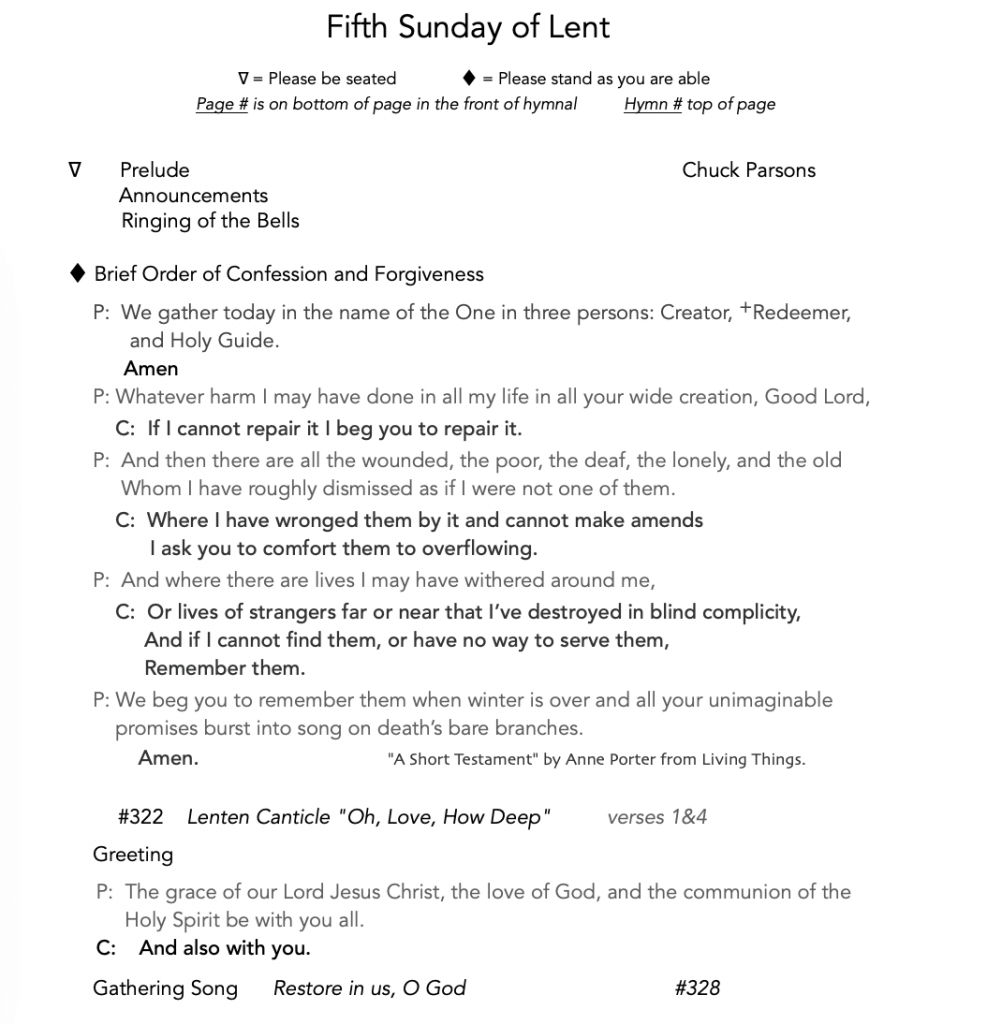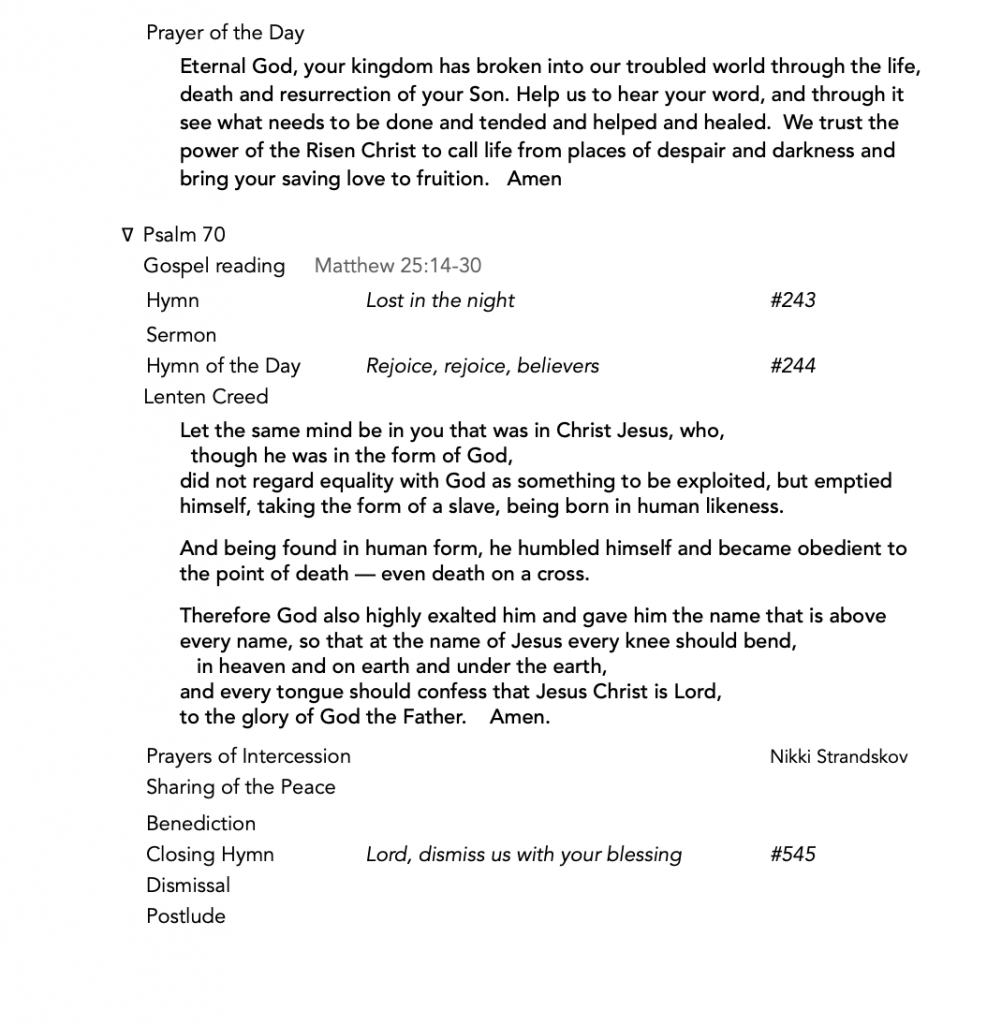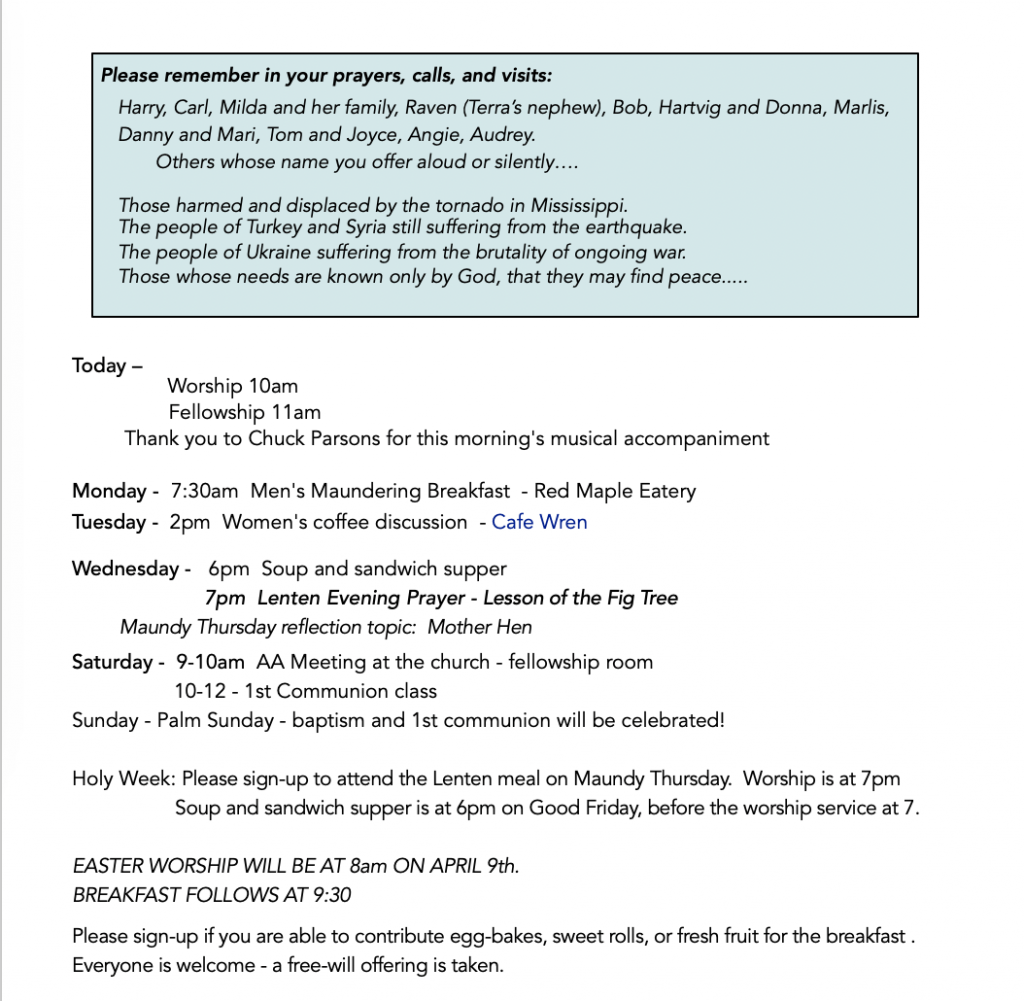Audio Recording


Matthew 25:14-30
Jesus continues to teach his disciples in parables saying,
“Then the kingdom of heaven will be like this. Ten bridesmaids took their lamps and went to meet the bridegroom. Five of them were foolish, and five were wise. When the foolish took their lamps, they took no oil with them; but the wise took flasks of oil with their lamps.
As the bridegroom was delayed, all of them became drowsy and slept. But at midnight there was a shout, “Look! Here is the bridegroom! Come out to meet him.’ Then all those bridesmaids got up and trimmed their lamps.
The foolish said to the wise, “Give us some of your oil, for our lamps are going out.’ But the wise replied, “No! there will not be enough for you and for us; you had better go to the dealers and buy some for yourselves.’ And while they went to buy it, the bridegroom came, and those who were ready went with him into the wedding banquet; and the door was shut.
Later the other bridesmaids came also, saying, “Lord, lord, open to us.’ But he replied, “Truly I tell you, I do not know you.’
Keep awake therefore, for you know neither the day nor the hour.
The gospel of the Lord……….thanks be to God.
You may notice that I’ve surrounded this scripture and sermon with Advent hymns. That’s because Lent is Advent in a minor key. Both are seasons of waiting and preparation. Lent prepares us for Easter by accompanying us through Jesus’ death, as Advent prepares us for the coming of Christ accompanying us through the long pause. Matthew didn’t think it would take this long. He and the other New Testament writers thought the return of the risen Christ would be imminent. And so the warning for constant vigilance and preparedness made a bit more sense.
Since the beginning of Lent we’ve been reading parables — but none of the narrative in between. So, unless you’ve noticed the chapters flying by from week to week, you might not realize where we are. The plot to kill Jesus, the last supper, and all that follows is just around the corner. The location of today’s parable in Matthew’s account is important.
It comes in the midst of sayings and teachings through which Jesus makes predictions about his death, condemns the scribes and Pharisees as hypocrites and blind guides, foretells the destruction of the temple and the coming persecution of his disciples, and casts the entire discussion in terms of God’s judgment and the eschatological end of all things.
The setting is important because, although the opening line remains, “the kingdom of heaven is like…” these later parables go on to relate stories that don’t sound anything like the kingdom of heaven.
The kingdom of heaven is like a fisherman who casts his nets into the sea bringing in fish of every kind. The fish are sorted. The good are kept, the bad thrown away. “So it will be at the end of the age,” says Jesus. “Angels will come to sort the righteous from the evil throwing the evil into the furnace where there will be weeping and gnashing of teeth.”
In teaching the parable of the wicked slave, Jesus warns of dire consequences if we don’t forgive endlessly and from our heart. Fig trees wither at his word. More than once someone is bound and thrown, wailing and gnashing their teeth, into the utter darkness. Doors are shut in the faces of 5 little maids by the bridegroom who claims not to know them. Servants are commended for underhanded business deals, while the one with just a little has even that taken from him. In the last parable Jesus tells, sheep are separated from goats – and it doesn’t end well for the goats.
Matthew’s Jesus tell harsh parables, and there’s no softening them.
In the parable we hear today, those deemed unfaithful, unwise, or ill-prepared end up with what seems to be a growing number of people wandering around wailing and gnashing their teeth in the dark.
Is this what the kingdom of heaven is like?
We know that Matthew was in a bad spot, historically, where urgency, decisiveness, and commitment were called for. That is not our place in history. But still ….. but don’t we, on occasion, need to hear this kind of jarring message to shake loose the spiritual cobwebs? to warn us of the danger of lolly-gagging through life? Do you ever need a wakeup call to remind you how fragile life can be, how fleeting, how fraught with uncertainty? Do you ever need a reminder to be mindful and careful, to live with an eye to the future and not fritter away the time and talents and treasures you’re given? I suspect distraction and complacency are the spiritual ills of our time. How do we live well in the in-between?
“Sisters, don’t grow weary, Brothers, don’t grow weary, Children, don’t grow weary,
for the time is drawing nigh.
Darker midnight lies before us, Lo, the morning soon is breaking, Christian, journey soon be over,
for the time is drawing nigh. Keep your lamps trimmed and burning, for the time is drawing
nigh.”
These are the words of a spiritual sung by African Americans suffering slavery. It served both as an expression of spiritual encouragement and as a way to communicate plans for escape. The chorus is not about Christ’s return, but on what to do during the delay…don’t grow weary, don’t give up hope, be ready for the day of freedom.
I appreciate that spin on the parable. Because our attention is not to be distracted by the five foolish maids and perhaps feeling sorry for them, but rather our eyes are to be on the wise ones – those whose reserve and resilience holds them through the night, whose focus is on accompanying the bridegroom, on bearing light.
If today’s parable, in fact, seems to be contrary to much of what we think Jesus teaches and does, it’s because parables tell something (but not everything) about the kingdom of God and our self-perceptions. Jesus was not shutting the door of heaven in the face of five innocent little maids longing to get in whose only fault was poor planning or being rushed and forgetful as they hurried out the door to meet the bridegroom.
Jesus was telling parables— cryptic little stories on a slant. He urges his followers to stay alert! Stay the course! Remember what I have told you and taught you and shown you. “For the days are surely coming,” says the Lord, ‘when I will not be with you, when you will be challenged, when you will hear contradictory and confusing messages – and it is your job to stay faithful, to keep your lamps trimmed, and carry a little something extra in your flasks to give you courage!’ For the challenges of following Jesus are very real. We have forgotten to expect his return. Matthew’s audiences were on the edge of their seats.
Next week, Jesus enters Jerusalem, has a last supper with his disciples. Chapter 26 sees Jesus taking the disciples to the garden of Gethsemane to watch with him and pray. “Peter, James, John, stay awake with me. Keep your lamps trimmed and burning.” But they can’t do it, they can’t stay awake. He comes three times and each time finds them asleep, their lamps burned out.
Chapter 26 ends with Peter sitting outside Pilate’s palace where Jesus is being “interviewed” and a servant girl approaches Peter and says, “You were with him, Jesus, that Galilean.” And three times Peter closes the door saying, “I do not know him.…”
So. That’s what the kingdom of earth is like – we can’t stay awake and watchful and mindful or in tune with the Holy One. Not for any length of time, anyway. When we are challenged or put on the spot or lost in grief or anger or arrogance or busy-ness we are quite likely to say, “I do not know you” and close the door on our fears and on the risks of loving God and our neighbor as ourselves.
But, it’s Lent and late March, and we also hear these parables of judgment with something of the farmer eyeing snow-covered fields. We hear them knowing that the ground is waiting for sunshine and seed. Jesus tells the parables before chapter 26, before his crucifixion, before Easter, before Pentecost – the day when his disciples were transformed from fishermen and disciples, into fishermen with a story to tell and the courage to tell it.
We remember that the door to the tomb was closed, but it didn’t stay that way. We remember that the door to the upper room was closed, locked, and barred, but Jesus came to the disciples anyway: Came to them and said, “Peace be with you, my peace I give to you.”
Could we ever be ready for this coming? The disciples never were. These parables, like all parables, are intended to alter lives, to twist the expected ending, to cause us to shake our heads clear and say, “What? What just happened?”
What has happened is God – and those inscrutable ways of the divine in earthly form. The God who requires our participation in her grand scheme.
What are we to do in the meantime? How are we to live? Loving kindness, doing justice, walking humbly with God and our fellow creatures is always a good place to start. Living with expectation instead of boredom or laissez-faire.
Parables don’t explain the kingdom of heaven, but they do reveal it – like spring fields…waiting, receptive, rocky, thawing, awakening to the warming sun. Today’s parable encourages – or admonishes – us to be like that, too. Wake up, stay awake, watch for and celebrate signs of God’s self-revelation, take yourself out of the center of the story and imagine it some other way, and, when the time does come, enter the wedding feast with joy. The night and its darkness will be past, the doors thrown open. Enter, then, into holy joy.
